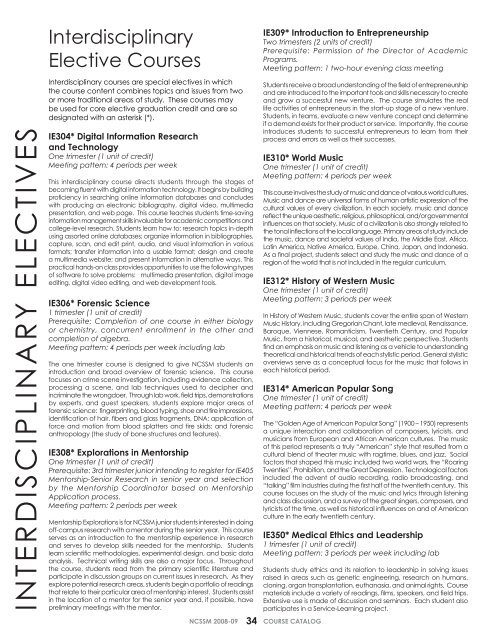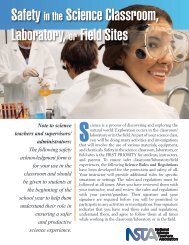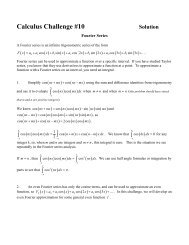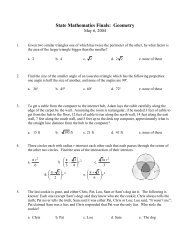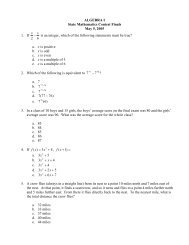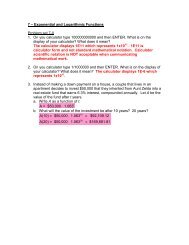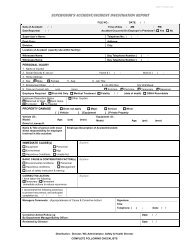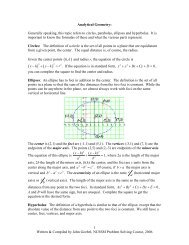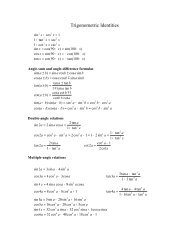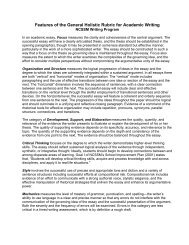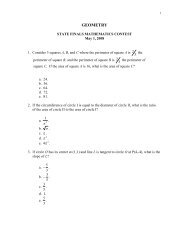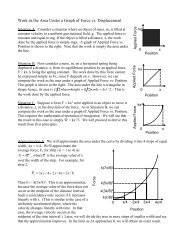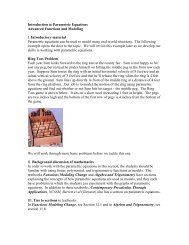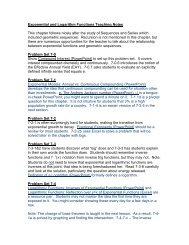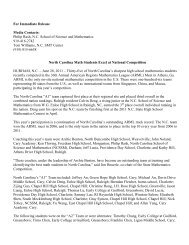Course Catalog - North Carolina School of Science and Mathematics
Course Catalog - North Carolina School of Science and Mathematics
Course Catalog - North Carolina School of Science and Mathematics
- No tags were found...
You also want an ePaper? Increase the reach of your titles
YUMPU automatically turns print PDFs into web optimized ePapers that Google loves.
INTERDISCIPLINARY ELECTIVESInterdisciplinaryElective <strong>Course</strong>sInterdisciplinary courses are special electives in whichthe course content combines topics <strong>and</strong> issues from twoor more traditional areas <strong>of</strong> study. These courses maybe used for core elective graduation credit <strong>and</strong> are sodesignated with an asterisk (*).IE304* Digital Information Research<strong>and</strong> TechnologyOne trimester (1 unit <strong>of</strong> credit)Meeting pattern: 4 periods per weekThis interdisciplinary course directs students through the stages <strong>of</strong>becoming fluent with digital information technology. It begins by buildingpr<strong>of</strong>iciency in searching online information databases <strong>and</strong> concludeswith producing an electronic bibliography, digital video, multimediapresentation, <strong>and</strong> web page. This course teaches students time-savinginformation management skills invaluable for academic competitions <strong>and</strong>college-level research. Students learn how to: research topics in-depthusing assorted online databases; organize information in bibliographies,capture, scan, <strong>and</strong> edit print, audio, <strong>and</strong> visual information in variousformats; transfer information into a usable format; design <strong>and</strong> createa multimedia website; <strong>and</strong> present information in alternative ways. Thispractical h<strong>and</strong>s-on class provides opportunities to use the following types<strong>of</strong> s<strong>of</strong>tware to solve problems: multimedia presentation, digital imageediting, digital video editing, <strong>and</strong> web development tools.IE306* Forensic <strong>Science</strong>1 trimester (1 unit <strong>of</strong> credit)Prerequisite: Completion <strong>of</strong> one course in either biologyor chemistry, concurrent enrollment in the other <strong>and</strong>completion <strong>of</strong> algebra.Meeting pattern: 4 periods per week including labThe one trimester course is designed to give NCSSM students anintroduction <strong>and</strong> broad overview <strong>of</strong> forensic science. This coursefocuses on crime scene investigation, including evidence collection,processing a scene, <strong>and</strong> lab techniques used to decipher <strong>and</strong>incriminate the wrongdoer. Through lab work, field trips, demonstrationsby experts, <strong>and</strong> guest speakers, students explore major areas <strong>of</strong>forensic science: fingerprinting, blood typing, shoe <strong>and</strong> tire impressions,identification <strong>of</strong> hair, fibers <strong>and</strong> glass fragments, DNA; application <strong>of</strong>force <strong>and</strong> motion from blood splatters <strong>and</strong> tire skids; <strong>and</strong> forensicanthropology (the study <strong>of</strong> bone structures <strong>and</strong> features).IE308* Explorations in MentorshipOne trimester (1 unit <strong>of</strong> credit)Prerequisite: 3rd trimester junior intending to register for IE405Mentorship-Senior Research in senior year <strong>and</strong> selectionby the Mentorship Coordinator based on MentorshipApplication process.Meeting pattern: 2 periods per weekMentorship Explorations is for NCSSM junior students interested in doing<strong>of</strong>f-campus research with a mentor during the senior year. This courseserves as an introduction to the mentorship experience in research<strong>and</strong> serves to develop skills needed for the mentorship. Studentslearn scientific methodologies, experimental design, <strong>and</strong> basic dataanalysis. Technical writing skills are also a major focus. Throughoutthe course, students read from the primary scientific literature <strong>and</strong>participate in discussion groups on current issues in research. As theyexplore potential research areas, students begin a portfolio <strong>of</strong> readingsthat relate to their particular area <strong>of</strong> mentorship interest. Students assistin the location <strong>of</strong> a mentor for the senior year <strong>and</strong>, if possible, havepreliminary meetings with the mentor.NCSSM 2008-0934IE309* Introduction to EntrepreneurshipTwo trimesters (2 units <strong>of</strong> credit)Prerequisite: Permission <strong>of</strong> the Director <strong>of</strong> AcademicPrograms.Meeting pattern: 1 two-hour evening class meetingStudents receive a broad underst<strong>and</strong>ing <strong>of</strong> the field <strong>of</strong> entrepreneurship<strong>and</strong> are introduced to the important tools <strong>and</strong> skills necessary to create<strong>and</strong> grow a successful new venture. The course simulates the reallife activities <strong>of</strong> entrepreneurs in the start-up stage <strong>of</strong> a new venture.Students, in teams, evaluate a new venture concept <strong>and</strong> determineif a dem<strong>and</strong> exists for their product or service. Importantly, the courseintroduces students to successful entrepreneurs to learn from theirprocess <strong>and</strong> errors as well as their successes.IE310* World MusicOne trimester (1 unit <strong>of</strong> credit)Meeting pattern: 4 periods per weekThis course involves the study <strong>of</strong> music <strong>and</strong> dance <strong>of</strong> various world cultures.Music <strong>and</strong> dance are universal forms <strong>of</strong> human artistic expression <strong>of</strong> thecultural values <strong>of</strong> every civilization. In each society, music <strong>and</strong> dancereflect the unique aesthetic, religious, philosophical, <strong>and</strong>/or governmentalinfluences on that society. Music <strong>of</strong> a civilization is also strongly related tothe tonal inflections <strong>of</strong> the local language. Primary areas <strong>of</strong> study includethe music, dance <strong>and</strong> societal values <strong>of</strong> India, the Middle East, Africa,Latin America, Native America, Europe, China, Japan, <strong>and</strong> Indonesia.As a final project, students select <strong>and</strong> study the music <strong>and</strong> dance <strong>of</strong> aregion <strong>of</strong> the world that is not included in the regular curriculum.IE312* History <strong>of</strong> Western MusicOne trimester (1 unit <strong>of</strong> credit)Meeting pattern: 3 periods per weekIn History <strong>of</strong> Western Music, students cover the entire span <strong>of</strong> WesternMusic History, including Gregorian Chant, late medieval, Renaissance,Baroque, Viennese, Romanticism, Twentieth Century, <strong>and</strong> PopularMusic, from a historical, musical, <strong>and</strong> aesthetic perspective. Studentsfind an emphasis on music <strong>and</strong> listening as a vehicle to underst<strong>and</strong>ingtheoretical <strong>and</strong> historical trends <strong>of</strong> each stylistic period. General stylisticoverviews serve as a conceptual focus for the music that follows ineach historical period.IE314* American Popular SongOne trimester (1 unit <strong>of</strong> credit)Meeting pattern: 4 periods per weekThe “Golden Age <strong>of</strong> American Popular Song” (1900 – 1950) representsa unique interaction <strong>and</strong> collaboration <strong>of</strong> composers, lyricists, <strong>and</strong>musicians from European <strong>and</strong> African American cultures. The music<strong>of</strong> this period represents a truly “American” style that resulted from acultural blend <strong>of</strong> theater music with ragtime, blues, <strong>and</strong> jazz. Socialfactors that shaped this music included two world wars, the “RoaringTwenties”, Prohibition, <strong>and</strong> the Great Depression. Technological factorsincluded the advent <strong>of</strong> audio recording, radio broadcasting, <strong>and</strong>“talking” film industries during the first half <strong>of</strong> the twentieth century. Thiscourse focuses on the study <strong>of</strong> the music <strong>and</strong> lyrics through listening<strong>and</strong> class discussion, <strong>and</strong> a survey <strong>of</strong> the great singers, composers, <strong>and</strong>lyricists <strong>of</strong> the time, as well as historical influences on <strong>and</strong> <strong>of</strong> Americanculture in the early twentieth century.IE350* Medical Ethics <strong>and</strong> Leadership1 trimester (1 unit <strong>of</strong> credit)Meeting pattern: 3 periods per week including labStudents study ethics <strong>and</strong> its relation to leadership in solving issuesraised in areas such as genetic engineering, research on humans,cloning, organ transplantation, euthanasia, <strong>and</strong> animal rights. <strong>Course</strong>materials include a variety <strong>of</strong> readings, films, speakers, <strong>and</strong> field trips.Extensive use is made <strong>of</strong> discussion <strong>and</strong> seminars. Each student alsoparticipates in a Service-Learning project.COURSE CATALOG


